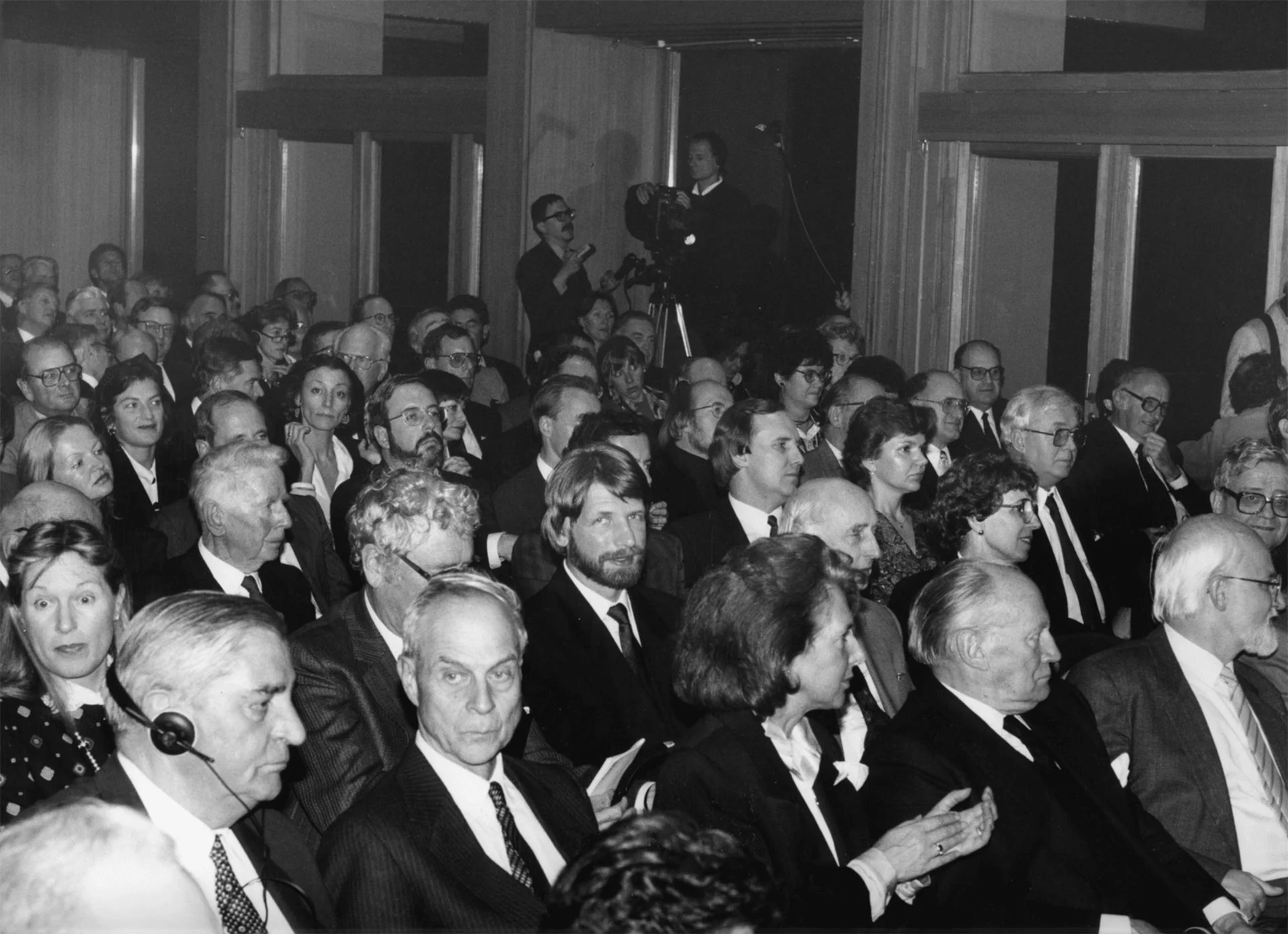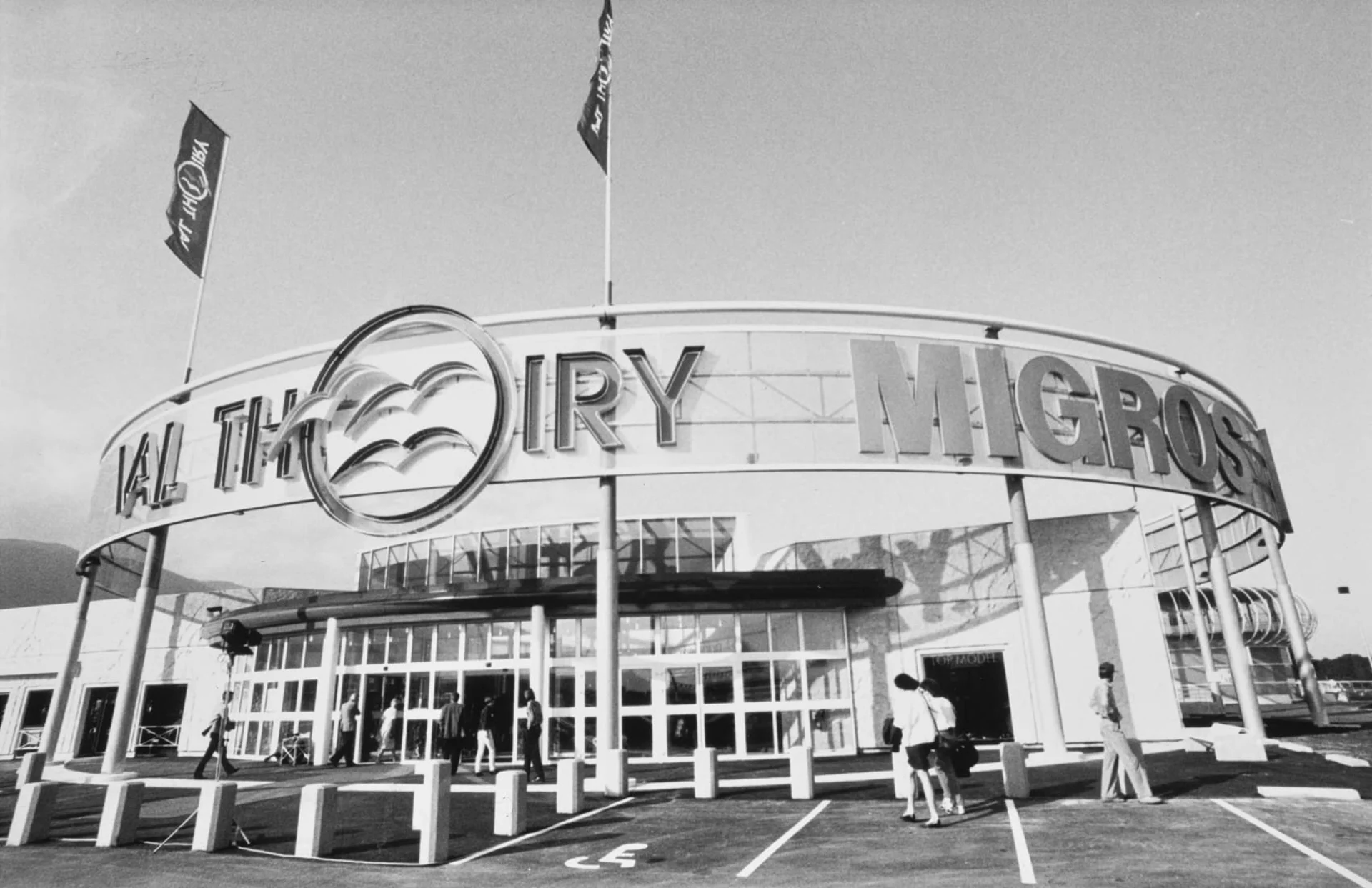
When the Czech Republic’s first president, Václav Havel, received the Gottlieb Duttweiler Prize, his acceptance speech made headlines. He compared Switzerland to a prison in which the inmates believed themselves to be free.
The awarding of the Gottlieb Duttweiler prize is always an important social event, but on 22 November 1990, the guests are particularly excited. The event has an international touch: The former dissident and Czech President Václav Havel is being honoured, and the laudatory speech is given by the author Friedrich Dürrenmatt.
Havel, who is honoured for championing human rights, is one of the leaders of the ”Samtene Revolution“, which brought about the end of the Communist regime in Czechoslovakia in
1989. He was the first president of the Czech and Slovak Federal Republic and is, since the dissolution of the countries, the first president of the Czech Republic.
The speech by Dürrenmatt is the cutting requital of an old man with his homeland. In an ”absurdity“, he describes Switzerland as ” a prison; of course, one quite different to the prisons in which you were thrown, dear Havel. It is a prison into which the Swiss have fled. Because everyone outside the prison is attacking each other and they are only safe from being attacked within the prison, the Swiss feel free, more free than all other people, free as prisoners in the prison of their neutrality.”
In his speech, Friedrich Dürrenmatt criticises Switzerland, the land of files and banks, and the behaviour of the Swiss towards political asylum seekers, conscientious objectors and foreign workers: ”Who does not want to be a prisoner in a prison where one is free, and so the prison has become a world attraction, many try to be prisoners, what they can be if they have the necessary resources, freedom is, after all, something valuable, whilst those without resources could seek if possible in prison that kind of safety to which only the free prisoners are entitled, and again many are refused entry.”
”The prison management is not to be envied. On the one hand, there are too few prisoners to keep the prison clean: the luxury cells, the corridors, and even the bars on the windows, so that people have to be let in to the prison who, just to earn money, renovate the prison, restore it, rebuild it and keep it going. On the other hand, there are those prisoners who, it is true, also earn money, but seem to be looking down on prisoners who are not free.»
On the one hand, there are too few prisoners to keep the prison clean, the luxury cells, the corridors, around the window bars, so that people have to be let in to the prison who, just to earn money, renovate the prison, restore it, rebuild it and keep it going, on the other hand, those prisoners who, it is true, also earn money, but are like looking down on prisoners who are not free.»
”Of course, we praise our direct democracy, of course, we have the old-age and surviving dependants' insurance and even introduced voting rights for women to the amazement of the world, and privately we are insured against death, illness, burglary and fire: he whose house burns down does well. Politics here has also moved out of ideology into the economy, its questions are economic questions. Where is the state allowed to intervene, where not; where to subsidise, where not; what to tax, what not? Wages, leisure time, are all regulated by negotiations. Peace threatens to become more dangerous than war. A terrible, but not a cynical sentence. Our streets are battlefields, our atmosphere is exposed to poisonous gases, our oceans are oil puddles, our fields are contaminated by pesticides, the Third World is plundered worse than the Orient was ever plundered by the Crusaders, it is no surprise that it now blackmails us. Peace is the father of all things, not war; war results only from unmanaged peace. Peace is the problem we have to solve.”
”Maybe you ask which republic I dream about. I answer you: an independent, free, democratic, economically prosperous and also socially fair republic, in short, a humane republic which serves the people and therefore has the hope that the people will also serve it. A republic of generally well-educated people, because without them, none of our problems can be solved, whether human, economic, ecological, social or political. Many Swiss dream that they live in such a republic, so to speak in the dream which you, Václav Havel, are dreaming.”
The laudatory speech for Václav Havel is the last great speech by Friedrich Dürrenmatt. He dies three weeks later, on 14 December 1990, of a heart attack.
Read more























































![Aussenansicht eines Giro-Dienst-Ladens (ca.1950er). [MGB_Dok_Fo_039668, Foto: Comet Photo AG, Zürich]](https://images.ctfassets.net/ra41rfif8mpw/GIlX8RhaVNHPQjIjoA2xc/077016a3bedfe99a689897b78449c5df/image.jpg?fm=webp&fit=fill&r=0&q=75&w=1920)




![Gottlieb und Adele Duttweiler (1940). [MGB_Dok_Fo_134651]](https://images.ctfassets.net/ra41rfif8mpw/1RyaMRR4yIbGXAH6cJkosL/5d5a79e0bd97eee93e60a934760166f7/image.jpg?fm=webp&fit=fill&r=0&q=75&f=bottom&w=1920)






















































![[MGB_Dok_Fo_139320 ]](https://images.ctfassets.net/ra41rfif8mpw/2K1om05HTKqptbGmPFdT72/02029f5baa8ad4f0d93c5a8d1feddecb/image.jpg?fm=webp&fit=fill&r=0&q=75&w=1920)


























![Pokal der "Boston Conference on Distribution" geehrt (1953). [MGB_Dok_Fo_001688]](https://images.ctfassets.net/ra41rfif8mpw/1bUjHMACdgT5rZWLAZppVz/dc2607266f24552feef75a0c820faca2/image.jpg?fm=webp&fit=fill&r=0&q=75&w=1920)


![Verkaufswagen der Migros Türk am Hafen in Istanbul (1956). [MGB_Dok_Fo_062220]](https://images.ctfassets.net/ra41rfif8mpw/1LuyG6kAHjUVQ1tADLVquJ/ffff2be6e5c8d7fb6ac7484eee7f3921/image.jpg?fm=webp&fit=fill&r=0&q=75&w=1920)














![Gottlieb Duttweiler im Gespräch mit dem Institutsleiter J. C. Somogyi (ca. 1959). [MGB_Dok_Fo_112002]](https://images.ctfassets.net/ra41rfif8mpw/51dw1rQVbza7Bk8LQqI3hM/5556aafc44449e414734b4e80aacedc3/image.jpg?fm=webp&fit=fill&r=0&q=75&f=top&w=1920)


![Erster Verkaufswagen mit Selbstbedienung der Migros (1960). [MGB_Dok_Fo_054662]](https://images.ctfassets.net/ra41rfif8mpw/5tZXdAbDnucsVVMyLw3Tgl/45c9ebdd88f5c31ae7c147f6e50eff9b/image.jpg?fm=webp&fit=fill&r=0&q=75&w=1920)

![Gottlieb Duttweiler mit den Primarschülern aus Capolago (1962). [MGB_Dok_Fo_054666]](https://images.ctfassets.net/ra41rfif8mpw/37QZTepDky5BTYANrRauXN/57f3fdf284845e5953cd1fbe57833a5d/image.jpg?fm=webp&fit=fill&r=0&q=75&f=top&w=1920)
![Trauergemeinde vor der Kirche (1962). [MGB_Dok_Fo_110098]](https://images.ctfassets.net/ra41rfif8mpw/40jk1o4oziFc7WSfyCMW0P/ec9c7585c8328d526ab3a5ed092ba5a4/image.jpg?fm=webp&fit=fill&r=0&q=75&w=1920)





















































































































































